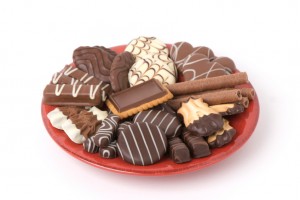Pain Specialist Townsville – Carbs? What carbs?

You probably hear it every day, don’t eat that, don’t eat this…try my wonder pill, drink our diet juice, run twenty miles, don’t run at all – but in the end, maintaining your weight boils down to consuming the same amount of energy as your body uses each day. If you put more energy in than you need, you will gain weight, if you put in less, you will lose weight…it is really that simple. So what’s the problem…how hard is that, right? Well, the problem is (a) most of us don’t know how much energy we burn each day and (b) most of us don’t know how much energy we consume each day.
For a woman weighing between 55-60kg and doing light activity, the body needs around 2000 calories or 8700 kilojoules. The average man needs 2500 calories or 10,500 kilojoules. Those are big numbers…but what does 8700 kilojoules look like when you put them on a plate? Foodwatch.com gives us an indication with these two menus…
Breakfast
2 weetbix 480kj
1 cup reduced fat milk 535kj
1 tablespoon of honey 95kj
1 banana 335kj
Morning Tea
1 choc chip muffin 925kj
1 cappuccino full cream milk 465kj
1 teaspoon sugar 65kj
Lunch
1 toasted cheese & tomato sandwich 980kj
1 tub of strawberry yoghurt reduced fat 760kj
Afternoon Tea
1 museil bar 325kj
1 apple 300kj
Dinner
spaghetti bolognaise & cheese 2,355kj
1 glass red wine 290kj
2 tim tams 790kj
And option two?
Breakfast – slept in didn’t eat any
Late Morning shopping
1 Gloria Jean’s large white mocha 1,870kj
1 banana bread slice with butter 1,615kj
Lunch – still shopping
1 McDonald’s Cheeseburger 1,190kj
1 Coca-Cola 375ml can 675kj
Dinner – can’t be bothered cooking
1 super supreme pizza, thin crust 2,350kj
1 Mars Bar 1,050kj
As you can see, getting to that 8700kj mark isn’t hard…and every day you go past your required energy intake, you raise the potential of weight gain. And it doesn’t matter if the food you eat is low fat, low sugar or low appeal – if it contains energy, then it contributes to your daily energy intake.
All right, so what is this energy stuff? As with all mammals, humans need energy in the form of carbohydrates to power our muscles and our brains. No carbohydrates, no life. And since carbohydrates are so important to the body, it has found various means of converting the food entering the stomach into these busy little molecules. Sugar is the number one power source for the body. From the moment they enter our mouth the glucose from grain, the fructose from fruit, the sucrose from cane sugar, and the galactose from milk are converting into monosaccharides that fuel our body…and it’s not just those working muscles either – the brain will consume more than 2000kj a day too.
But sugar isn’t the only energy source. Fat can also be converted into carbohydrates – and contrary to popular belief it doesn’t go straight to the thighs. Instead it passes through the stomach to the small intenstine where bile changes it into fatty acids and triglycerides that then enter the bloodstream. If the body can’t find enough sugar in your last meal to run on, it then starts turning those triglycerides into carbohydrates. This is why fat is not necessarily bad for us, the muscles don’t really care what’s fueling them…providing they can consume all the fuel on offer.
Where things go wrong for us is when we consume more sugars and fats than the body needs to run on. When this happens, the body begins storing the excess carbohydrates in handy energy packs called? You guessed it, fat cells. Each cell can store 13kj of energy for a rainy day, but if that rainy day of going hungry never happens, then those cells start building up into weight gain. And as it turns out, energy is not created as equals. The body needs to burn 115kj to convert 500kj of carbohydrates into fat. But it needs only 13kj to put the same amount of fatty acids and triglycerides into a fat cell. In short, if there’s more unused fat floating around the bloodstream than sugar, the fat will be the first choice for filling up your fat cells…and once that’s tucked away the excess sugar starts turning into fat too. This, for many of us, is where our weight troubles start.
So, now armed with the processes of energy production and storage for your body you can see putting more petrol in the tank than you need is our main problem…but the big question is what should fuel should we avoid more? Premium, E10 or unleaded…or sugar, alcohol and bread?

 Book Now
Book Now



